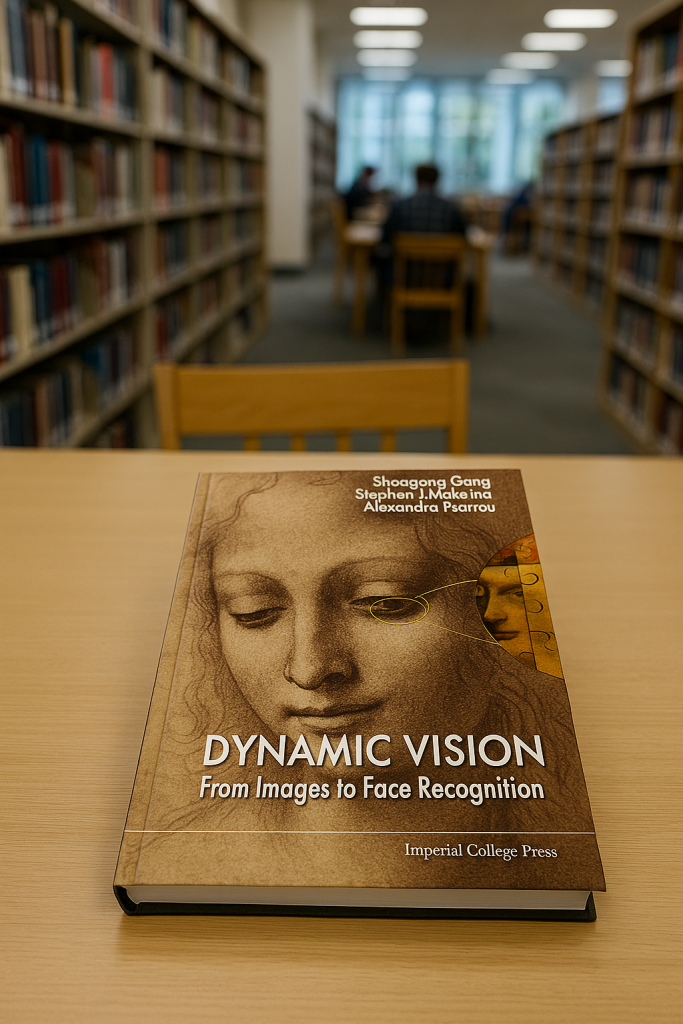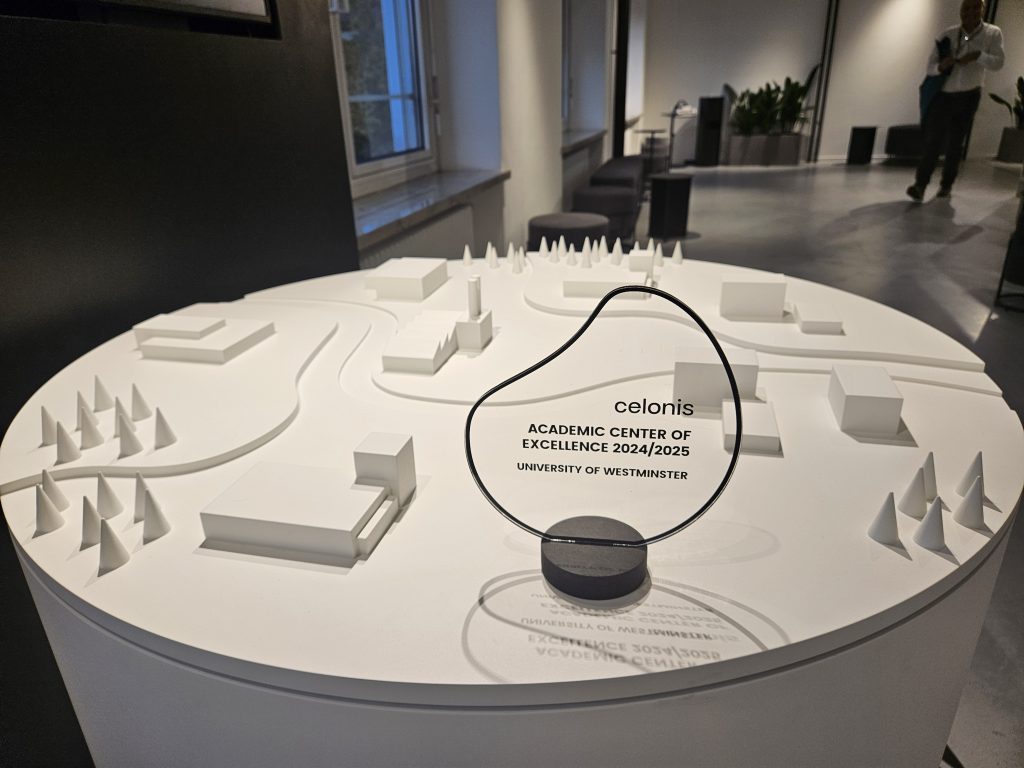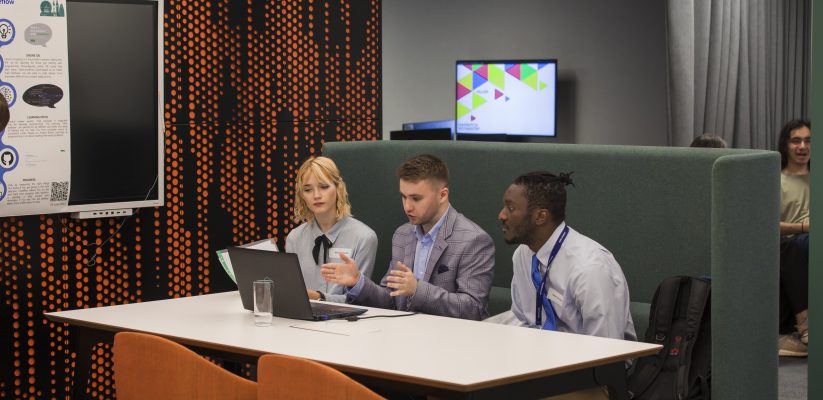Our Applied Artificial Intelligence MSc course is designed to prepare students for careers at the forefront of AI innovation. We spoke with four academic team members, Dr Ester Bonmati Coll, Dr Hamed Hamzeh, Dr Aleka Psarrou and Dr Artie Basukoski, who bring diverse expertise and perspectives to this cutting-edge programme.
Through their insights, we explore what sets this course apart, why Westminster offers a distinctive and supportive environment for AI education, and what advice they have for those looking to build successful careers in this rapidly evolving field.
Can you tell us a bit about yourself and your area of expertise?
Ester Bonmati Coll: I am a Lecturer in Computer Science and Engineering at the University of Westminster with a research background in medical imaging. Over the past seven years, my work has focused on developing innovative artificial intelligence models to support and improve healthcare applications.
Before joining Westminster, I was a researcher at University College London, where I contributed to several projects, including the development of a novel medical device aimed at improving the prostate cancer diagnosis as well as methods for early detection of pancreatic cancer.
My expertise centres on applying AI to enhance the interpretation of medical images, helping to tackle some of the most pressing challenges in modern healthcare by improving diagnostic accuracy and supporting clinical decision-making.
Hamed Hamzeh: I am a Lecturer in Data Science at the University of Westminster. My journey with Westminster began as a researcher within the Centre for Parallel Computing, where I contributed to several EU-funded projects, including the DigitBrain project. My current research focuses on the intersection of Artificial Intelligence and Multi-Agent Systems, with a particular interest in how these technologies can be applied to optimise cloud-native frameworks.
Aleka Psarrou: I have had a rewarding and extensive teaching career at the university, specialising in computer vision, artificial intelligence, and neural networks. My passion for these fields began during my second year at university, during a lecture on AI, when computer vision captured my imagination and made me think of its potential impact on society. I became particularly fascinated by the idea of creating algorithms to assist visually impaired individuals.
As I have progressed in my career, I worked on the development of cutting-edge computer vision applications in areas such as facial recognition, gesture detection, body movement analysis, and cultural heritage preservation. I also focused on enhancing imaging systems’ performance. Throughout these projects, I have remained committed to advancing knowledge in these fields, continually researching and sharing insights on how algorithms can be applied to solve meaningful real-world challenges.
Artie Basukoski: I am an Assistant Head of School at the University of Westminster with extensive experience in industry and higher education. My research spans a broad range of ideas, including automated reasoning, software specification and verification and machine learning. Recently, my work has focused on applying Process Mining, Data Mining and Machine Learning techniques to improve outcomes within the healthcare sector.

What do you think makes the Applied Artificial Intelligence MSc at Westminster stand-out?
Ester Bonmati Coll: This master’s is a fantastic opportunity for students who are deeply interested in AI. What makes it stand out is the strong focus on the application of AI to solve real-world problems. Students learn theory, but they also get to work on practical problems, often in multidisciplinary research teams. The course also emphasises ethical and responsible AI, which is essential in today’s rapidly evolving tech landscape.
Additionally, the diverse background of our students and colleagues fosters rich discussions and unique perspectives, making the learning experience dynamic and inclusive. By the end of the programme, graduates are well-equipped to enter the job market with the confidence and skills needed to make a meaningful impact.
Hamed Hamzeh: I believe the Applied Artificial Intelligence MSc at Westminster offers a truly distinctive experience. The curriculum is designed to be interdisciplinary, drawing upon expertise from various departments within the university and offering a holistic understanding of AI’s impact across different sectors. Being situated in a vibrant city like London provides students with unparalleled opportunities for networking, industry engagement, and exposure to the cutting edge of AI innovation.
Aleka Psarrou: What makes our course stand out is our team’s diverse expertise in artificial intelligence, spanning from the theoretical foundations to the practical applications in key areas such as computer vision, natural language processing, data mining, and industrial support systems. This comprehensive approach ensures that students gain a strong understanding of the core principles behind AI algorithms. Through hands-on experience with real-world applications, students will learn the entire pipeline required to design, implement, and deploy AI models across various domains.
Why did you choose Westminster?
Ester Bonmati Coll: I chose the University of Westminster because of its strong commitment to inclusivity and its open-minded, forward-thinking academic environment. From the very beginning, I was drawn to the university’s diverse community, where people from all backgrounds and cultures come together to learn, collaborate, and innovate.
Another major factor was its location right in the heart of London. Being based in such a vibrant and globally connected city offers countless opportunities for collaboration, networking, and staying at the forefront of emerging trends in technology and research.
The university’s modern facilities and investment in cutting-edge resources further support both teaching and research, creating an environment where students and staff alike can thrive.
Artie Basukoski: Westminster was founded on the principle of education for all and practical and professionally relevant learning. I have been with Westminster for 25 years and enjoy the inclusive atmosphere and dynamic learning, teaching and research environment.

As professionals and academics working within IT, Computing and AI industries, what have been some of your career highlights?
Ester Bonmati Coll: One of the most meaningful highlights of my career has been contributing to the design, development, and clinical evaluation of a medical device that is now used globally to support the diagnosis of prostate cancer. Knowing that this work is directly improving the lives of patients worldwide is incredibly rewarding and drives my passion for applied research.
Another defining moment has been witnessing the rapid rise of AI in recent years. It has been both inspiring and motivating to see the field gain widespread recognition, particularly in healthcare. While my main area of research lies in medical imaging, I’m increasingly interested in how AI can be applied more broadly to create a positive societal impact, specially as we navigate the ethical challenges of integrating AI into everyday life.
Aleka Psarrou: When I began my career, fields such as computer vision, neural networks, and parallel computing were still in their early stages. The technological advancements we see today are built on the pioneering work and the foundational research from that period, which paved the way for modern era of deep learning. In the 2000s, I had the privilege of contributing to foundational work in face recognition, statistical modelling, and neural networks. This research led to my co-authoring a book titled “Dynamic Vision: From Images to Face Recognition” which has since become a key resource in postgraduate programmes worldwide, particularly in computer vision, machine learning, and cognitive studies. It has been incredibly rewarding to see the book adopted by students, researchers, and professionals across the globe and to know it continues to make an impact in the field.
Artie Basukoski: Throughout my career, I’ve maintained a broad and deep interest in AI -from symbolic reasoning and building expert systems using Prolog and Lisp, to contemporary developments in machine learning and LLMs. One of the highlights has been establishing a Process Mining research team within the Health and Social Care Modelling group in 2016.
A particularly proud moment was forging a partnership with Celonis, a global leader in Process Mining. What started as an Academic Alliance grew into a formal recognition of our work. Westminster was designated Celonis Academic Centre of Excellence, significant achievement that reflects both the impact and innovation of our research.

What would your advice be to aspiring professionals or academics who would like to pursue a career within artificial intelligence?
Ester Bonmati Coll: My advice would be to stay curious, be persistent, and never underestimate the value of a multidisciplinary mindset. AI is a fast-evolving field that intersects with so many areas – from healthcare and finance to ethics and the arts – so having a broad perspective and being open to learning from other domains can be a real advantage.
Engage with real-world problems, seek out collaborative projects, and do not be afraid to ask questions – some of the best ideas come from challenging assumptions. AI is a collaborative field, and being part of a network will not only inspire you but also open opportunities you may not have imagined.
Hamed Hamzeh: Firstly, build a strong foundational understanding of the core mathematical and computational principles underpinning AI. Secondly, cultivate a passion for continuous learning, as this field is rapidly evolving. Finally, seek out practical experience through internships, projects, and collaborations to apply your knowledge to real-world problems. Networking is also crucial – engaging with the AI community, attending conferences, and connecting with professionals in the field.
Artie Basukoski: Pursue your passion. Develop a strong foundation in AI principles and techniques so that you can take advantage of the rapidly evolving opportunities that AI will bring in the future.
About Westminster
As one of the most diverse universities in the UK, we are a global university with London energy, with more than 19,000 students from 169 countries. To find out more about our Computer Science and Engineering courses, visit our website.
